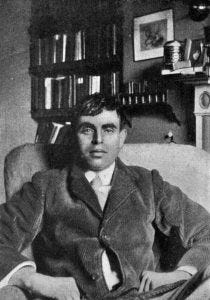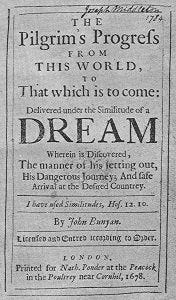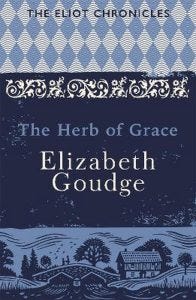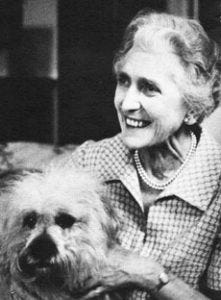Beatrice Groves – The Golden Journey to The Hallmarked Man
With The Hallmarked Man launch coming ever closer and J. K. Rowling treating us to a new Twitter Header, Beatrice Groves, Research Fellow and tutor at Trinity College, Oxford, and author of Literary Allusion in Harry Potter, has written a Hogwarts Professor Guest Post: The Golden Journey to The Hallmarked Man.
The Golden Journey to The Hallmarked Man
On late 3rd or early 4th August 2024 Rowling changed her header to another The Hallmarked Man clue – four lines from James Elroy Flecker’s The Golden Journey to Samarkand (1913):
We are the Pilgrims, master: we shall go
Always a little further: it may be
Beyond that last blue mountain barred with snow
Across that angry or that glimmering sea.
(For the full poem, see: Poetry Nook)
This poem was published in 1913, but the reason that this section is called ‘epilogue’ is because it forms part of Flecker’s play Hassan:
Hassan (The Story of Hassan of Bagdad and How He Came to Make the Golden Journey to Samarkand) is a five-act drama in prose with verse passages. It tells the story of Hassan, a young man from Baghdad who embarks on a journey to Samarkand, a city in Central Asia. Along the way, he encounters various challenges and obstacles, including bandits, treacherous terrain, and political turmoil. Hassan was not staged in Flecker’s lifetime, and was published posthumously in 1922.
The luscious orientalism of the poem appears to be influenced by Keats (also a favourite of Rowling’s) – see for example Flecker’s list of what the travellers are carrying:
We have rose-candy, we have spikenard,
— Mastic and terebinth and oil and spice,
And such sweet jams meticulously jarred…
Flecker is using biblical words here to evoke the riches of the East: Abraham sees God as he sits under the terebinth trees of Mamre and Jesus’ feet are anointed with the fabulously expensive perfume spikenard. But the list also recalls Keats’s in The Eve of St Agnes and, indeed, it seems likely that the ‘silken Samarcand’ in this passage inspired Flecker:
While he forth from the closet brought a heap
Of candied apple, quince, and plum, and gourd;
With jellies soother than the creamy curd,
And lucent syrops, tinct with cinnamon;
Manna and dates, in argosy transferr’d
From Fez; and spiced dainties, every one,
From silken Samarcand to cedar’d Lebanon.

As you can see from the ‘influence’ section of the Wikipedia entry on Flecker, The Golden Journey to Samarkand has, in its turn, cast quite a spell on a number of writers. A quick internet reveals that many have even undertaken the journey inspired by the poem:
[Flecker] studied at Trinity College, Oxford, and at Gonville and Caius College, Cambridge. While at Oxford he was greatly influenced by the last flowering of the Aesthetic movement there under John Addington Symonds, and became a close friend of the classicist and art historian John Beazley. In his poetic writings he would always return to Greece and the Middle East. It’s believed the few lines from his most well- known poem The Journey to Samarkand (1913) has inspired thousands of people to take to the Silk Road city in southern Uzbekistan.
One of those who has taken the journey – will Strike fans be following in his footsteps?! – is an Australian mentioned by the mathematician Dr T.E. Forster in his blog on the power of this poem:
It has always been a bit of a mystery to me why this poem delights and possesses me so entirely. I encountered it as an adolescent, and that of course is a time when one makes life-long attachments, for better or worse… [I] think that the poem derives its longevity by being placed at the very end of the play, where it is a wonderful evocation of the hopes, potential mysteries and unforseeable revelations promised in the open-ended adventure… I had a correspondent from Australia who wrote to me that, having loved this poem all his life, in his retirement he—well—took the Golden Road to Samarkand and just bloody well went there… He said his family thought him crazy to travel halfway across the world just because of a line in a poem. We should all be crazy like that. https://www.dpmms.cam.ac.uk/~tef10/poem36.html
The first thing that struck me about the poem as a possible epigraph text for (or quotation within) The Hallmarked Man is how close it is in mood to the poem about the restless urge for travel and adventure with which Cuckoo’s Calling ends – ‘I cannot rest from travel: I will drink/ Life to the lees’ (from Tennyson’s ‘Ulysses’ – I wrote this up in my first pair of Strike blogs here) This link with Tennyson’s poem in Flecker’s pilgrim song is part of the quest/pilgrim nexus that underlies so much quest and fantasy literature – from The Faerie Queene and Don Quixote to Lord of the Rings. This pilgrim trope also runs throughout Rowling’s works – from the underlying influence of Bunyan’s Pilgrim’s Progress on Harry, Ron and Hermione’s quest, to the literal (and grotesque) use of this poem in Silkworm, culminating with the more recent return to Pilgrim’s Progress as a positive blueprint in The Christmas Pig. It seems that journey-as-pilgrimage will be returning in full force in The Hallmarked Man – and I am delighted to see that.
The second thing that struck me was, of course, the alchemical possibilities of the title of Flecker’s poem – some gold to add to all that silver! I’ve written about the possible influence of alchemy and precious metals on Strike 8 before and had predicted the keyword ‘silver’ in the title of all the epigraph texts of The Hallmarked Man – maybe instead they will all have a precious metal in the title? The ‘sound of silver bells’ in the wider poem was also a line that stood out given that we know Silver Bells, by Dean Martin is going to play some kind of role. Most striking in this regard is the ‘glimmering sea’ of Rowling’s header quotation, as it is so close the silver sea of the previous epigraph text we have been given. That sea turned silver by the sun glinting from it: ‘“A silver sea! A silver sea!” he cried aloud, and into his mind there flashed an incongruous comparison of the bountifulness of Nature’s silver with the pitiful grains they hacked out of her rocks with such toil and hardship’ (A Maid of the Silver Sea).
When I read the line ‘we shall go/ Always a little further,’ though, something was tugging at me – I’d read this line before in a text related to Rowling and I couldn’t quite place it. And then I remembered – it was in Elizabeth Goudge’s The Herb of Grace (1948).
We tend to imagine authors in our own image. As Goudge’s Little White Horse was Rowling’s favourite childhood novel I imagine her – like myself at that age – seeking out all the books by her favourite author. Just as I read definitely unsuitable Roald Dahl short stories at a tender age and went to my local bookshop to order up Chronicles of Avonlea and Rilla of Ingleside from the USA because they were not published in the UK, so I imagine Rowling leaving no Goudgean rock unturned. (Indeed, as evidence that she was like this, I suspect one reason for taking an alias for Strike was to save such children from reading Career of Evil!). Goudge was a major fan of Hassan and this Pilgrims’ Song plays an important role in her The Castle on the Hill – I’ll be seeking that out! – but Rowling could also have come across these lines in one of Goudge’s best novels: The Herb of Grace.
This novel is built around a pilgrim theme. In it, the Eliot family have moved into a medieval house called the Herb of Grace, which is an old Pilgrim Inn. Carved into a niche of the house is a medieval stone deer, which is the tutelary saint, or lares, of both the house and the book. Slowly comes the recognition that this is no ordinary deer, but the cruciferous (crucifix-bearing) stag of St Eustace – and as the characters experience grace in their lives they have their own sightings of this deer. And, as I have written elsewhere I think that St Eustace’s stag, and Goudge’s imaginings of him, are one source for the deer patronus in Harry Potter.
As Goudge’s characters discuss the holiness of woods that surround their Pilgrim Inn, one of them uses the precise image that occurs in Deathly Hallows of following a white deer further into the wood: ‘a deer turning his head to look at you and then disappearing through the trees – they lure you on and on; you want to go always a little father – to something – some clearing in the wood… [Do artists and saints] go always a little farther on than the rest of us, follow the white deer a bit father on? Like those men in Hassan – ‘We are they who go always a little farther’’ (Goudge, Herb of Grace). This phrase from Hassan, therefore, if Rowling did read and remember it there, links back to Harry’s own moment of setting off to follow the silver doe. (Silver again).
The Golden Journey to Samarkand is a famous poem and clearly when Goudge was writing these were very well-known lines, though I think they are a little more obscure now. Rowling could, of course, come across them anywhere – but I like to think that (as for me) the first time was on reading Goudge’s Herb of Grace. Either way, the quotation from the pilgrim’s song in Hassan suggests that the pilgrim motif so important to both Harry Potter and The Christmas Pig will be making a re-appearance in Strike. We know what quest our two heroes are really on, and journeys end in lovers meeting as Shakespeare tells us.
All of Dr Groves’ on line Rowling scholarship can be found in the Beatrice Groves Pillar Post.






